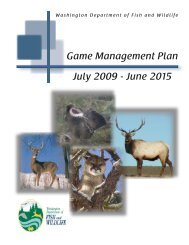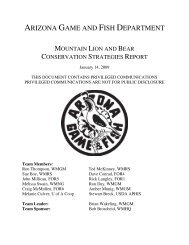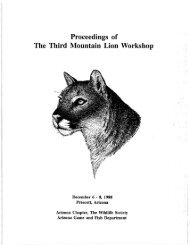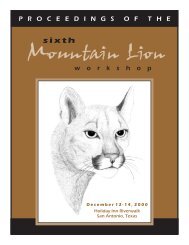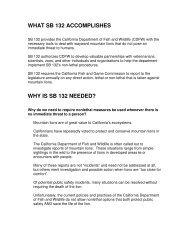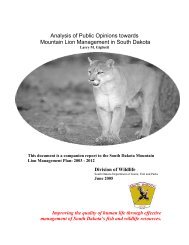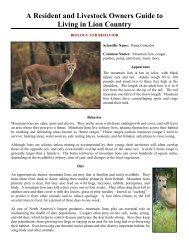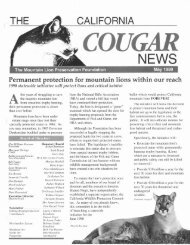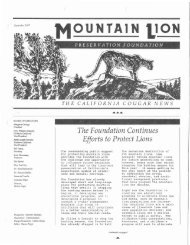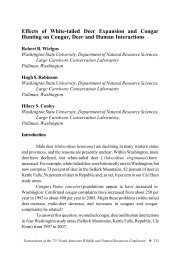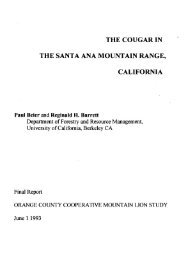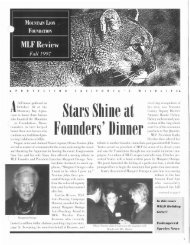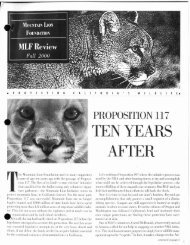Proceedings of the Ninth Mountain Lion Workshop - Carnivore ...
Proceedings of the Ninth Mountain Lion Workshop - Carnivore ...
Proceedings of the Ninth Mountain Lion Workshop - Carnivore ...
Create successful ePaper yourself
Turn your PDF publications into a flip-book with our unique Google optimized e-Paper software.
Hunt Regulations<br />
Since <strong>the</strong> 8 th <strong>Mountain</strong> <strong>Lion</strong> <strong>Workshop</strong> in 2005, Arizona has maintained a multiple bag<br />
limit quota for mountain lions in areas with translocated bighorn sheep populations or<br />
declining bighorn sheep and mule deer (Odocoileus hemionus) populations (n=9) in an<br />
effort to increase hunter opportunity in specific areas. Additionally, new regulations have<br />
included: <strong>the</strong> implementation <strong>of</strong> a required carcass check-in by all successful mountain<br />
lion hunters for <strong>the</strong> collection <strong>of</strong> a tooth for aging and hair for DNA analysis; a reduction<br />
<strong>of</strong> <strong>the</strong> hunting season from 12 months to 9 months during <strong>the</strong> period September-May; all<br />
successful mountain lion hunters must now report <strong>the</strong>ir kill within 48 hours; female<br />
mountain lions with spotted kittens are protected; and livestock-depredating mountain<br />
lions may now be taken and possessed with a non-permit tag.<br />
Harvest<br />
Arizona’s past 5-year average sport harvest <strong>of</strong> mountain lions is 228, with a range <strong>of</strong> 204-<br />
251. Arizona’s 36-year average sport harvest is 223, with a range <strong>of</strong> 120-326. During<br />
2007, Arizona sold approximaely 10,433 non-permit mountain lion tags, a decrease <strong>of</strong><br />
498 tags from 2006. In 2007, <strong>the</strong> first year <strong>of</strong> a mandatory carcass check-in, female<br />
mountain lions represented 42% (n=104) <strong>of</strong> <strong>the</strong> total sport harvest (n=250). The average<br />
number <strong>of</strong> females in <strong>the</strong> annual sport harvest over <strong>the</strong> past 20 year period was 104.<br />
Livestock Depredation<br />
Figure 2. Arizona <strong>Mountain</strong> <strong>Lion</strong> Harvest Data for 1989-2007<br />
<strong>Mountain</strong> lions killed as <strong>the</strong> result <strong>of</strong> livestock depredation events in 2007 was 28, and<br />
averaged 40 animals over <strong>the</strong> past 5 years with a range <strong>of</strong> 28-63. Seasonal diet selection<br />
for calves by mountain lions in Arizona has been calculated as high as 44% frequency <strong>of</strong><br />
occurrence in scats during <strong>the</strong> spring (Cunningham et al. 1995). Strategies to reduce<br />
livestock depredation (e.g. continuous herding, pasturing out <strong>of</strong> prime mountain lion<br />
habitat during calving, conversion <strong>of</strong> cow/calf operations to steer only) are mostly<br />
unavailable for livestock operators to implement due to Arizona’s abundant and rugged<br />
acreage <strong>of</strong> federally managed leased lands for grazing. Reductions in overall livestock<br />
Figure 2. Arizona <strong>Mountain</strong> <strong>Lion</strong> Harvest Data for 1989-2007.<br />
numbers due to recent drought conditions has reduced total livestock numbers in Arizona<br />
and may be partially responsible for reduced incidences <strong>of</strong> livestock depredation.<br />
Human/<strong>Mountain</strong> <strong>Lion</strong> Interactions<br />
AZGFD has developed an action plan that guides employees in responding to<br />
human/mountain lion interactions. The plan was developed after extensive public input<br />
<strong>Proceedings</strong> <strong>of</strong> <strong>the</strong> <strong>Ninth</strong> <strong>Mountain</strong> <strong>Lion</strong> <strong>Workshop</strong><br />
87



